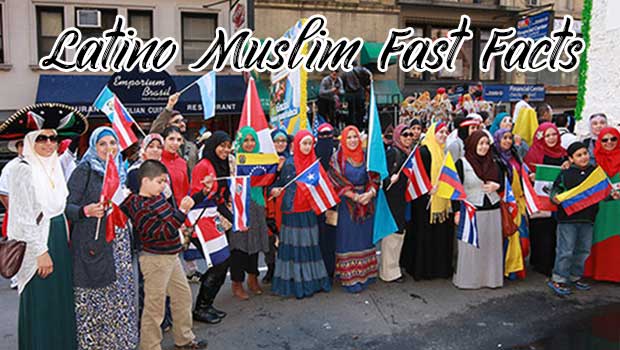September 15 to October 15 marked the 30th National Hispanic Heritage Month in the United States, a month-long tribute established by President Ronald Reagan on September 14, 1989. It is, therefore, worth reflecting on the important presence of Latin American Muslims who represent the fastest growing population of Muslims in the United States. The seeds of Islam continue to be planted across the nation and Muslims from the Latino community play a great role in helping to make the deen accurately known and easily accessible to ever-widening numbers of Americans.
A Latino is a person who was born or lives in South America, Central America, or Mexico or a person in the U.S. whose family is originally from South America, Central America, or Mexico (Merriam-Webster Dictionary). Latino origin is based on ancestry, culture, nationality and/or country of birth. Therefore, Latino people come from a variety of countries, ethnic backgrounds, and social traditions. Hispanic refers to a person of Latin American descent or relates to the people, speech, or culture of Spain (Merriam-Webster Dictionary). According the U.S. Census Bureau, as of 2017 there were an estimated 58.9 million Hispanic people in the U.S., which is equivalent to 18.1 percent of the entire population. Only Mexico has a larger Hispanic population than the U.S.!
Latinos find that Islam resonates with their spirituality, morals, family values, social struggles, and traditions
The ten states with the largest populations of Hispanics are Arizona, California, Colorado, Georgia, Florida, Illinois, New Jersey, New Mexico, New York, and Texas. In a map developed by the Spanish department of ICNA’s WhyIslam project, the team identified prominent Latino Muslim organizations and active individuals and found that the majority were in one of these ten states.
Not surprisingly, Spanish is the second most widely spoken language in the United States. There are 21 countries in the world where Spanish is the official language. Most are in Central and South America, and the Caribbean. Brazil is considered part of Latin America even though the official language is Portuguese. Mexico is also the only Spanish-speaking country that shares a border with the U.S. One fascinating and little-known fact about the Spanish language is that it shares a special bond with Arabic. Muslims ruled Spain for eight centuries, from 711 to 1492. During that time, Spanish was even written in Arabic script, and it borrowed countless words from Arabic. About 30 percent of the words in the Spanish language have Arabic roots. A few examples are algodon in Spanish/al-qutun in Arabic (cotton), fulano in Spanish/fulan in Arabic (so and so), and aceituna in Spanish/zaytun in Arabic (olive).
There were Muslims in the Americas before the arrival of Christopher Columbus, and African Muslims who were brought to this country as slaves. The Muslim population in Latin America is over 4 million. Latinos are also the fastest growing minority in the U.S., and the fastest growing minority within Islam, and it is estimated that 12 percent of converts to Islam in the U.S. are Latinos.
Among the many reasons why Latinos are drawn to Islam is the belief in tawhid, or the natural inclination to believe in the Oneness of God; putting faith into practice; the importance of balance and moderation in everyday life; and there being no intermediaries needed (such as clergy) between a human being and God — each individual seeks a personal relationship with Allah. There are many cultural similarities between Islam and what Latinos hold dear, including family values and morals (the proper upbringing of children, respect for elders, and adult children caring for elderly parents) and community ethics such as support for the poor and underprivileged, and the promotion of social justice and affirmation of equality in human worth regardless of religion, gender, race, or ethnicity (yet, one can distinguish himself or herself through piety and virtue).
Some of the most popular sayings in Latin America have Islamic roots or are very similar to Islamic values or teachings. For example, the saying, “Al que madruga, Dios le ayuda (God helps the one who wakes up early) is like what the Prophet (peace be upon him) said, “O Allah, bless my nation in their early mornings” (Sunan Ibn Majah). Another is “Donde comen dos, comen tres (Where two eat, three eat); this is similar to what the Prophet (pbuh) said, “The food of one person is enough for two, the food of two is enough for four, and the food of four is enough for eight” (Muslim). ”Díme con quién andas y te diré quien eres” (Tell me who you hang out with, and I will tell you who you are) is similar to the Prophet’s advice, “A man follows the religion of his best friend, so each one of you should look at whom he befriends” (Tirmidhi).
Latinos find that Islam resonates with their spirituality, morals, family values, social struggles, and traditions. The internet and social media have made information about Islam more accessible to Latinos. Furthermore, Latinos and Muslims have come together in solidarity in the face of recent injustices and oppression of their groups. Latinos have a lot in common with Muslims, and that is perhaps because many are descendants of European, African, and indigenous Muslims. Islam is in our blood!





